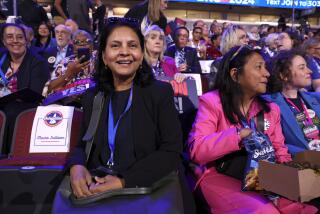Indian-Americans Mourn the Loss of Their Leader : Assassination: Participants at two local ceremonies say Gandhi’s murder ‘crosses the party line.’
- Share via
With emotional speeches and traditional prayers, members of Southern California’s Indian-American community remembered former Prime Minister Rajiv Gandhi on Sunday as an inspirational leader, a part of history and a symbol of the modern India.
“The first thing that went through my mind was, ‘Oh God, not again,’ ” Rajen S. Anand, chairman of the Indo-American Political Assn., recalled of the moment he learned that Gandhi had been killed in a bomb explosion Tuesday.
Gandhi, a member of a family dynasty that began with his grandfather, Jawaharlal Nehru, led the world’s largest democracy for five years after his mother, Indira, was assassinated in 1984.
“People may have a difference of opinion on him and his policies, but he was our leader,” said Rajen, a physiology professor at Cal State Long Beach. “His violent death has touched everyone. Events like this bring the community together.”
Standing next to a portrait of Gandhi and a large orange, white and green Indian flag at a Cerritos community center, Santosh Kumari, a local religious leader, led 200 people in a prayer for India’s future at one of two memorial services Sunday. She said the killing shocked Southern California’s Indian-American community, which numbers about 80,000 and is concentrated in Cerritos and Artesia.
“Even if we don’t have relatives there, country is country,” said Kumari, who like many women present was wearing a brightly colored, traditional sari. “We are branches and India is the root. People feel as though a family member died. They were consoling each other.”
Organized by the Federation of Indo-American Assn., a coalition of 80 Indian organizations throughout the area, the memorial service featured a recitation of some of the prayers given at Gandhi’s funeral in New Delhi on Friday. They were accompanied by a harmonium and tabla, traditional Indian instruments.
“It is a sad day--a great, charismatic leader has left us,” said Shiva G. Bajpai, a professor of Indian history at Cal State Northridge who met Gandhi last fall at an educational conference in New Delhi.
Bajpai said he felt a loss on many levels when he learned of Gandhi’s death.
“It was a personal loss,” he said. “I also felt a loss for the country and a historical loss as well. History has been cut short. He symbolized the unity of India, the secular democracy and India’s place among nations.”
Bajpai, who left India for London in 1964 and came to the United States three years later, said local Indians, like those across the world, are concerned about who will fill the political vacuum now that Gandhi is dead and his widow, Sonia, has refused to accept leadership of the Congress I Party.
Dr. Krishan S. Krishna, an Anaheim cardiologist who is president of the Federation of Indo-American Assn., compared Gandhi to past U.S. leaders who have been assassinated, including John F. Kennedy and the Rev. Martin Luther King Jr.
“We are all very sad,” Krishna said. “We wanted to combine together and share our grief and not forget what he stood for--democracy, unity and equality.”
In a separate, small memorial gathering in Bellflower Sunday, Shiva Subramanya, a scientist at TRW, said he was traumatized by Gandhi’s death even though he was not a supporter of the former prime minister.
“As a Hindu, the most fundamental belief is that every life is sacred,” said Subramanya, a member of the Vishwa Hindu Parishad of America. “That’s the reason I was very sad. That’s the reason I’m here. It has nothing to do with his policies. It crosses the party line.”
More to Read
Sign up for Essential California
The most important California stories and recommendations in your inbox every morning.
You may occasionally receive promotional content from the Los Angeles Times.










